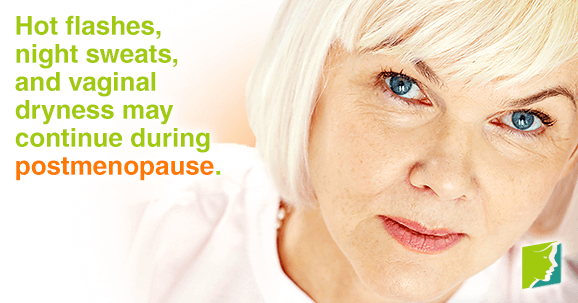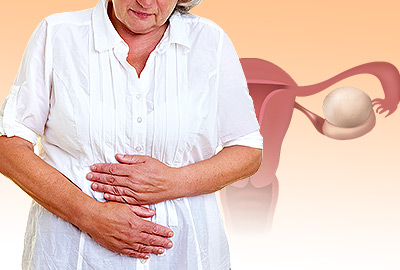A woman is considered postmenopausal once she has gone 12 months without having a period. While this marks the end of her menstrual cycle, unfortunately some menopause symptoms might linger.
Once postmenopause has begun, production of estrogen and progesterone continue decreasing. This means that while the menopause symptoms associated with fluctuating hormone levels subside, those caused by low hormone levels might continue. Read on and regain control over your body.
Hot Flashes
They are one of the most common symptoms of the menopause. Characterized by a sudden sensation of heat followed by flushing, perspiration and occasionally chills, the feeling can occur day or night. Unfortunately, you might find that menopausal hot flashes continue into postmenopause.
Irregular Periods
During perimenopause, you might receive sporadic periods. After 12 months without one however, you can be sure that you'll never have to buy another tampon. If you experience bleeding during postmenopause, you must seek medical advice. While the cause is likely to be minor, it will not constitute a menstrual period and could be a sign of a more serious health concern.
Vaginal Dryness
Unfortunately, vaginal dryness can be a tough symptom to shift postmenopause. As with other menopausal symptoms, vaginal dryness is caused by reduced estrogen levels. Due to the consequent reduction in vaginal lubrication, sex can become painful.
Mood Swings
Lack of sleep due to night sweats, emotional confusion about the end of fertility and aging, all are reasons which can contribute to a woman feeling irritable or upset. Avoiding alcohol and engaging in regular exercise can help you deal with mental unrest.
Other Health Issues
Although less common, the following are important health concerns during postmenopause:
Urinary issues
Although it might seem embarrassing, due to weakening pelvic floor muscles, urinary incontinence is a common postmenopause experience. There are several forms of incontinence which women might suffer from including:
- Stress incontinence
- Urge incontinence
Don't try to ignore or live with incontinence, this is a treatable condition.
Due to decreased levels of estrogen and the consequent reduction of natural vaginal lubrication, the chance of experiencing vaginal tract infections also increases postmenopause.
Osteoporosis
The hormone estrogen plays a vital role in bone growth as it informs cells when to stop breaking down. As estrogen levels drop, a woman's chance of developing brittle bones increases. Woman entering the menopause should increase their calcium intake and engage in regular weight-bearing exercise.
Coronary disease
Coronary artery disease is the narrowing of arteries surrounding the heart. This occurs when high levels of cholesterol gather in the artery walls. Women postmenopause are more at risk as cholestoral levels rise during menopause.
Although some of these symptoms may continue into postmenopause, various treatments exist to manage them. To figure out how to give your postmenopausal symptoms the boot, click on the link below.
Sources
- Harvard Medical School. (2015). Menopause-related hot flashes and night sweats can last for years.Retrieved July 9, 2015 http://www.health.harvard.edu/blog/menopause-related-hot-flashes-night-sweats-can-last-years-201502237745
- National Institute on Aging. (2015).Postmenopausal Health Concerns. Retrieved July 9, 2015 https://www.nia.nih.gov/health/publication/menopause-time-change/postmenopausal-health-concerns
- Office on Women's Health. (2012). Menopause and menopause treatments fact sheet (n.d.). Retrieved July 9, 2015 http://www.womenshealth.gov/publications/our-publications/fact-sheet/menopause-treatment.html#c
- Cleveland Clinic. (2015). Diseases & Conditions. (n.d.). Retrieved July 9, 2015 http://my.clevelandclinic.org/health/diseases_conditions/hic-what-is-perimenopause-menopause-postmenopause
- National Institute on Aging.(2015).Postmenopausal Health Concerns. Retrieved July 9, 2015. https://www.nia.nih.gov/health/publication/menopause-time-change/postmenopausal-health-concerns




